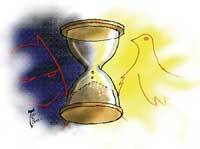Desert Days
To change one’s lifestyle can be extremely difficult. Yet many people today are faced with painful lifestyle choices as the economic crisis deepens and unemployment escalates. Catastrophic climate change, natural disasters, illness and other personal tragedies as well impose on us changes in our way of life. In today’s Gospel, Jesus invites all to choose a change in lifestyle. It is not imposed, but failure to accept it will have disastrous consequences.
Repentance, metanoia, is a change of mind and heart, a lifelong process of transformation. Jesus is not asking for a temporary forgoing of something pleasurable, like giving up chocolate for Lent. Sometimes such practices become simply a test of willpower. The metanoia to which Jesus invites us is both a turning away from whatever inhibits the full flourishing of the divine intent for creation and a turning toward the source of divine love. There is no better time to begin turning than now. Good intentions to make better lifestyle choices in the future become empty rhetoric in light of Jesus’ urgent invitation: “This is the time,” the kairos. Kairos means the opportune time, the right time, as distinguished from chronos, simple chronological time.
This crucial time is marked by the presence of two simultaneous forces: the divine Spirit who empowers us to choose what is of God, and Satan, the Adversary, who pulls us in the opposite direction. In the Gospel, the Spirit drives Jesus into the desert, where choices are clearer. In biblical tradition, the desert symbolizes the place where these two opposing forces meet.
The desert can be a place of danger, where wild beasts dwell or revolutionaries hide out. It was a place of testing for Israel, where they turned on their leaders and murmured against God (Nm 10:11–21:34). In prophetic tradition, the desert wandering became romanticized into a honeymoon time for Israel, where the people could be alone with their beloved God, with nothing to distract from their heart-to-heart sharing (Hos 2:14). So too for Jesus; the Spirit is with him in the desert, but also the Adversary—all those systems and forces that are opposed to God.
Unlike Matthew and Luke, Mark does not describe in detail the precise ways in which Jesus was tempted. What Mark emphasizes is that God’s power is stronger than satanic forces. Using Greek verbs in the imperfect tense, which indicates ongoing action that began in the past, Mark says that the divine presence is always with Jesus, as angels “ministered to him” (diekonoun auto). The whole of Mark’s Gospel is framed by this phrase. At the close of the Gospel, Mary Magdalene and the other Galilean women who followed Jesus to Jerusalem and stood at the cross “ministered to him” diekonoun auto (Mk 15:40).
The good news that Jesus announces and embodies is that God’s ministering, comforting and empowering presence is at hand now, at this kairos time and at every moment, especially in times of crisis. Jesus does not announce that God will rescue us from experiencing bleak times of trial or of frightening chaos, as with the out-of-control flood waters in the story of Noah. The good news is that God never abandons the beloved creation and all the living beings with whom the covenant has been made.
To accept this good news is to accept the invitation to change—to conform our manner of living to God’s ways. The psalmist lists some of the characteristics of such a life: truth, compassion, love, kindness, goodness, uprightness, humility and justice. Even though we miss the mark, it is precisely to sinners that God makes these divine ways known (Ps 25:8).
Deliberately retreating into desert space can help us clarify the precise choices we need to make in order to live this manner of life. Like Jesus, who goes to Galilee to carry on the work begun by John the Baptist even though he knows John has been arrested, we too are not naïve about the high cost of choosing to accept and spread the good news.
This article also appeared in print, under the headline “Desert Days,” in the February 23, 2009, issue.








